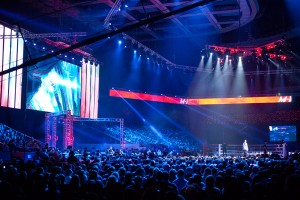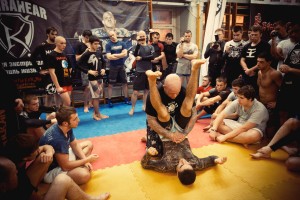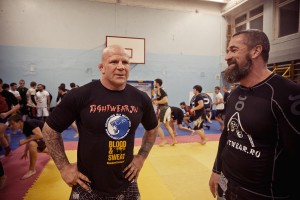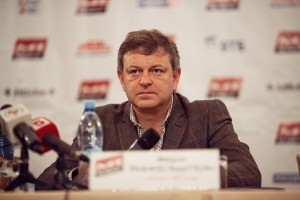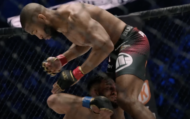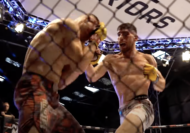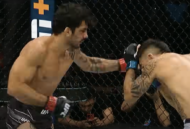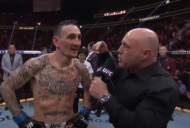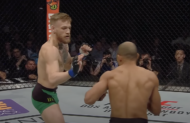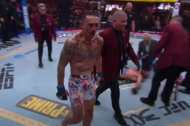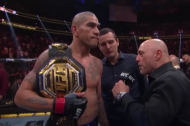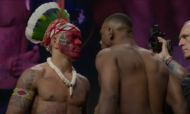Fedor vs. Monson: An American Journalist In Russia Offers A Deep Look Into M-1 Global And Vladimir Putin Being Booed By Fight Fans
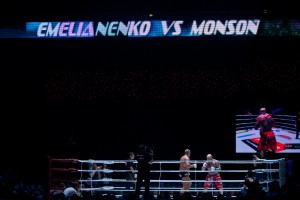
All-time great Fedor Emelianenko squares off with fellow heavyweight Jeff Monson in the main event of M-1 Global's MMA affair in Moscow, Russia on Nov. 20
By Stephen V. Hoyt, Ph.D.
The only thing missing from the “Battle of Legends” at the Moscow Olympisky Sports Complex was the Russian Army.
Putin was there. Every fight except the M-1 “Championship” had a Russian—and the Russians all conveniently won. Fans – 22,000 of them – chanted “Rossiya Rossiya” (what the Russians call the country) every chance they got.
Fedor ‘The Last Emperor’ Emelianenko, who though Russian, was proclaimed Emperor in Japan, entered the arena to the loudest rendition of the “Volga Boatmen” I’ve ever heard. (I half expected to see the haggard workers towing a barge along the great river in 19th century Russia.). As Fedor entered, a huge mosaic on the giant screens presented his life, from cute kid to soldier in the Russian Army. This was a nationalist event on a grand scale.
There was an extra treat at the end of the evening, after Fedor was unanimously proclaimed victor. Putin was booed when he began speaking to the crowd of fight fans about politics.
State Duma—the Russian Parliament—elections take place on 4 December and Putin plans on winning back his the presidency in March 2012. Putin, if you’re not aware, is ‘campaigning’ for the presidency, which in Russia means that he is making appearances everywhere possible.
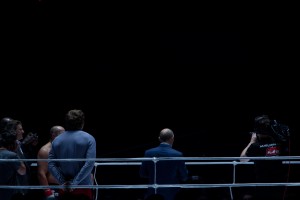
Russian Prime Minister Vladimir Putin (center) addresses the crowd at the event. M-1 Global President Vadim Finkelstein denies that Putin was booed by the crowd, but writer Stephen V. Hoyt and fans maintain otherwise
The most interesting feature of the Russian electoral process under Putin is that if an opposition party gets too strong, he simply bans the party and arrests the leaders for some mysterious charges. This was the first time that Russians have expressed such a common opinion in public. Many Russians have told me their dissatisfaction with Putin and, while Putin does not need a mandate from the people, he does nonetheless want to be liked.
The booing represents a shift in Russia, where it is estimated that one-percent of the population controls 80 percent of the wealth. Under Putin’s rule, corruption is rampant and media are completely under state control. While those watching the live television broadcast heard the booing, those who tuned in to the rebroadcast heard only Putin. The booing went strangely unheard.
In the promotional campaign for “Battle of Legends,” Jeff Monson, Fedor’s opponent, was proclaimed an “American Hero.” This added to the nationalist flavor of the event, setting up an America vs. Russia fight, which must have excited the Russian MMA audience. M-1 Global’s co-owner, Vadim Finkelstein (pronounced ‘Finkelstain’ in Russian), in direct response to a question by this writer at the weigh-in, claimed that a Russian television station had referred to Monson as an American hero. Yet, the M-1 Global website paraded the words “American Hero” across the screen, juxtaposed next to pictures of the American fighter who is a self-professed anarchist.
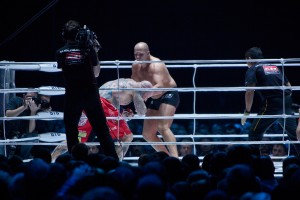
All-time MMA great Fedor Emelianenko (right) controlled American Jeff Monson (left) throughout their main event encounter
The audience was treated to a flurry of advertisements for Fedor’s line of sports clothing between rounds. This is not surprising since Fedor is actually part owner of M-1, although it is questionable whether this part-ownership truly benefits the Russian fighter. The general sentiment is that Fedor has lost large sums of money by sticking with Finkelstein, a former vegetable importer, instead of inking a deal with the UFC.
The ‘Battle’ was the largest ever MMA event in Russia. The main event between Emelianenko and Monson was less than exciting. Emelianenko, who says he had no intention of retiring no matter what the outcome, in an interview at the weigh-in, was happy to keep the bout standing. He unleashed fierce leg kicks that ended up breaking Monson’s right tibia. Monson, liked by the Russian media and MMA fans, sustained a stress fracture in the second round and managed to survive the rest of the fight “on adrenaline.”
Monson was taken to a Russian hospital, where he witnessed the best of Russian medicine, complete with cigarette smoking doctors in the ER and people hanging around in the corridors. A big schedule of seminars and related activities during fight week seemed to sap some of the strong grappler’s strength.
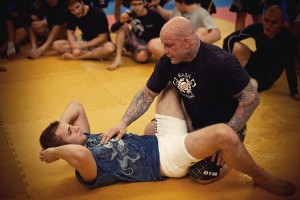
Despite a long journey from The U.S. to Russia, having to adjust to a nine hour time difference and the difficult task of Emelianenko in front of him, Monson was an incredibly good sport during fight week, conducting two different MMA seminars for Russian students.
Monson had wowed 90 students in a two-day seminar at the “Lions Club,” where Russia’s only Gracie black belt, Leonid Gatovsky, teaches. The soft spoken Monson wound his way through Moscow traffic on Thursday night for one and one-half hours in what would have taken 30 minutes on the Metro and rolled around with the 90 students from 6:30 until 10:00.
He then spent more time having his picture snapped with a long line of admirers. His demeanor and approach revealed his extensive experience.
Among those impressed were Sergei Badyuk, a long-time Russian martial artist, body builder and trainer of Russian Special Forces (SpetsNaz) troops. Badyuk told me that Monson was a “real man, someone who isn’t afraid to put himself on the line.” Badyuk further stated that he has attended hundreds of seminars and found Monson’s to be one of the best.
Others were equally impressed by the Snowman’s friendly and generous nature. The seminar was conducted only hours after Monson’s 10 hour flight touched down in Russia. After such a lengthy flight and a nine-hour time difference, I usually find myself staring at the wall, not catering to 90 energetic MMA students.
Moscow photographer and marketing specialist Vera Golosova described Monson as “my hero” for his work ethic, friendly manner and willingness to give to the students. Monson repeated the herculean effort on Friday night, staying even longer to pose with students and autograph posters.
The seminar was organized by the Russian online MMA magazine BloodandSweat. The magazine’s editor, Igor Sidorov, told me that Russians do not like trash talk. They prefer to let the fighter’s voice be heard in a match. He described the long road that Russia has taken to MMA and how practitioners are thirsty for training and instruction by veterans like Munson.
Sidorov also took part in the training both days that cost each participant 3,000 rubles, approximately 100 US dollars. The seminar, while well-attended, was challenging for Monson since translation help had not been arranged.
While he did not do well exchanging punches with Emelianenko, Monson did do well expressing his political views and exchanging information with the public. A “Russia 2” television correspondent asked Finkelstein whether Munson’s contract had a clause to prohibit Monson from talking about politics in Russia. Finkelstein answered that M-1 was not going to ask him about anything political, but Monson was free to say whatever he wished. Finkelstein’s answer was, oddly enough, not translated into English.
Amongst some of the issues that Monson discussed after the fight were the prospects of developing a fighter’s union, especially in the UFC, one which would be similar to unions involved in collective bargaining in other professional sports. He mentioned that it is very unlikely that a current fighter would attempt to organize other fighters since it would most certainly be frowned upon by power brokers in the sport.
Finkelstein avoided an interview by claiming he could not understand or speak English well. When offered an interview in Russian with a translator, he responded “We’ll do it later.”
Finkelstein, while obviously not above fanning the flames of nationalism by using the term “American Hero,” went to great pains on the M-1 Global website to criticize those who dared mention that Putin was booed. He mentioned that “some people would play dirty politics and make something up like that” and added “not in US or anywhere else would a president or prime minister visit an event like this.”
That part is right. Most politicians in parts of the world where elections are actually decided by voters would not use such events to further their own agendas.
Finkelstein further claimed that “To me it’s clear that some people are trying to take advantage and use it for their purposes. It’s sad.” He is right. It is sad. Sad that he feels obligated to concoct a story that was reported by every major media outlet, from the “Washington Post” to the “New York Times” and the “Guardian.”
Who would use such an event for their own purposes? It is difficult to imagine, given that most in the United States have never heard of M-1.
His claim that the spectators were booing Monson is perhaps the most ludicrous of all. Fight fans often boo a controversial decision, express loud disapproval over an unpopular decision in a close fight that might go against the crowd favorite, or the hometown hero, but I have never heard a crowd boo the loser. Since the decision was not close and the hometown hero won, the claim holds about as much water as the validity of the next Russian election.


